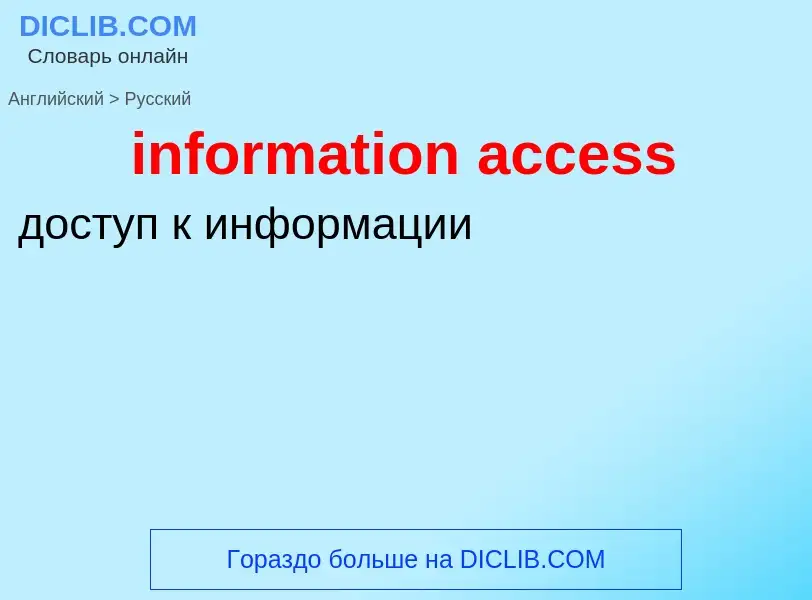Перевод и анализ слов искусственным интеллектом ChatGPT
На этой странице Вы можете получить подробный анализ слова или словосочетания, произведенный с помощью лучшей на сегодняшний день технологии искусственного интеллекта:
- как употребляется слово
- частота употребления
- используется оно чаще в устной или письменной речи
- варианты перевода слова
- примеры употребления (несколько фраз с переводом)
- этимология
information access - перевод на русский
общая лексика
файл базы данных в СУБД Access
общая лексика
прямой [произвольный] доступ
способ организации доступа к устройству памяти, при котором для чтения/записи произвольного блока данных не требуется последовательный просмотр блоков, начиная с самого первого, например ОЗУ, диски
произвольный порядок обращения
синоним
[infə'meiʃ(ə)n'saiəns]
синоним
Википедия
Information access is the freedom or ability to identify, obtain and make use of database or information effectively.
There are various research efforts in information access for which the objective is to simplify and make it more effective for human users to access and further process large and unwieldy amounts of data and information.
Several technologies applicable to the general area are Information Retrieval, Text Mining, Machine Translation, and Text Categorisation.
During discussions on free access to information as well as on information policy, information access is understood as concerning the insurance of free and closed access to information. Information access covers many issues including copyright, open source, privacy, and security.
Groups such as the American Library Association, the American Association of Law Libraries, Ralph Nader's Taxpayers Assets Project have advocated for free access to legal information. The vendor neutral citation movement in the legal field is working to ensure that courts will accept citations from cases on the web which do not have the traditional (copyrighted) page numbers from the West Publishing company. There is a worldwide Free Access to Law Movement which advocates free access to legal information. The Wired Magazine Article Who Owns The Law is an introduction to the access to legal information issue. Postsecondary organizations such as K-12 work to share information. They feel it is a legal and moral obligation to provide access (including to people with disabilities or impairments) to information through the services and programs they offer.
Some effects of charging for information access, such as literature searches for physicians, is studied in the article "Fee or Free: The Effect of Charging on Information Demand". In this study, a $5 charge resulted in a 77% decrease in searches.

![[[Gottfried Wilhelm Leibniz]], a German [[polymath]] who wrote primarily in Latin and French. His fields of study were [[Metaphysics]], [[Mathematics]], [[Theodicy]]. [[Gottfried Wilhelm Leibniz]], a German [[polymath]] who wrote primarily in Latin and French. His fields of study were [[Metaphysics]], [[Mathematics]], [[Theodicy]].](https://commons.wikimedia.org/wiki/Special:FilePath/Gottfried Wilhelm Leibniz, Bernhard Christoph Francke.jpg?width=200)
![[[Joseph Marie Jacquard]] [[Joseph Marie Jacquard]]](https://commons.wikimedia.org/wiki/Special:FilePath/Joseph Marie Jacquard.jpg?width=200)
![[[Vannevar Bush]], a famous information scientist, ca. 1940–1944 [[Vannevar Bush]], a famous information scientist, ca. 1940–1944](https://commons.wikimedia.org/wiki/Special:FilePath/Vannevar Bush portrait.jpg?width=200)
![A picture showing scratches on the readable surface of a CD-R. Music and data CDs are coded using error correcting codes and thus can still be read even if they have minor scratches using [[error detection and correction]]. A picture showing scratches on the readable surface of a CD-R. Music and data CDs are coded using error correcting codes and thus can still be read even if they have minor scratches using [[error detection and correction]].](https://commons.wikimedia.org/wiki/Special:FilePath/CDSCRATCHES.jpg?width=200)

